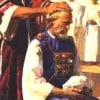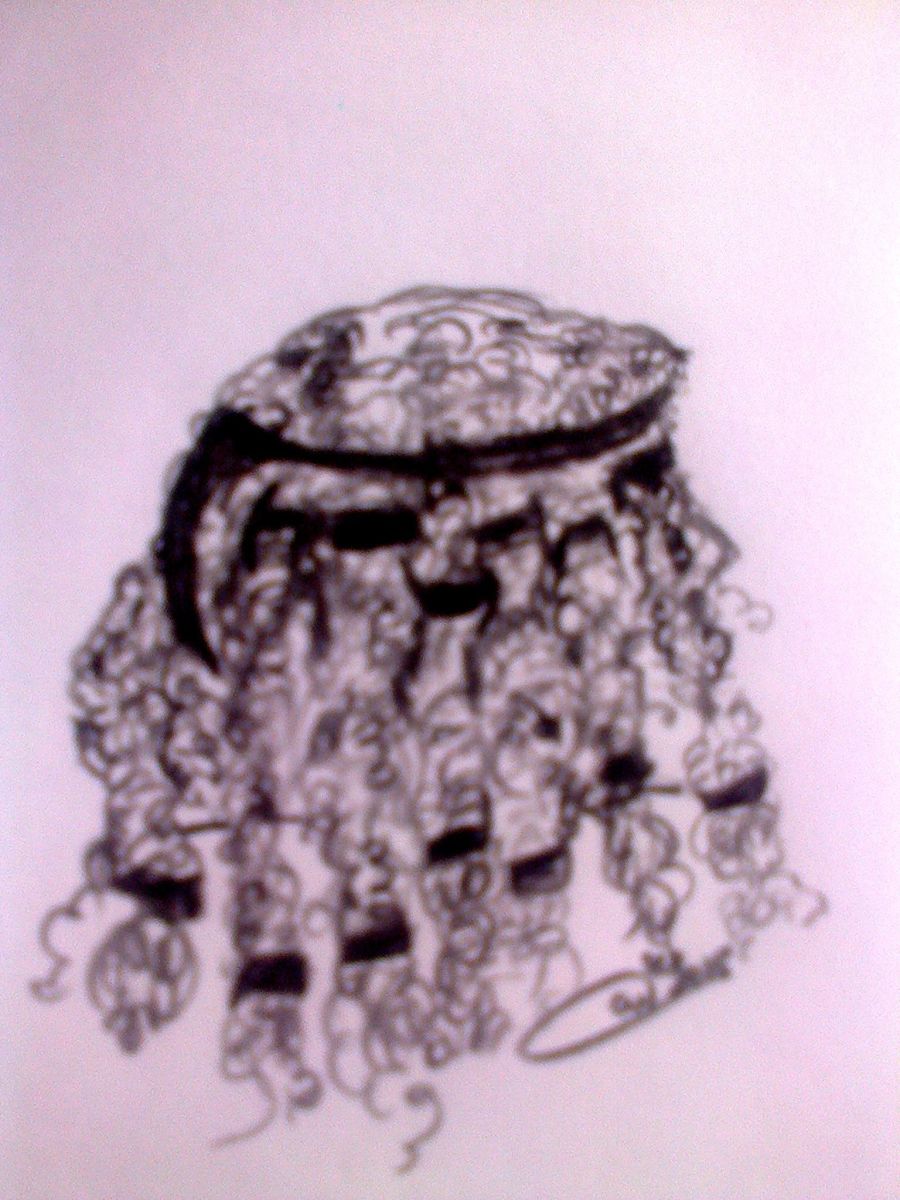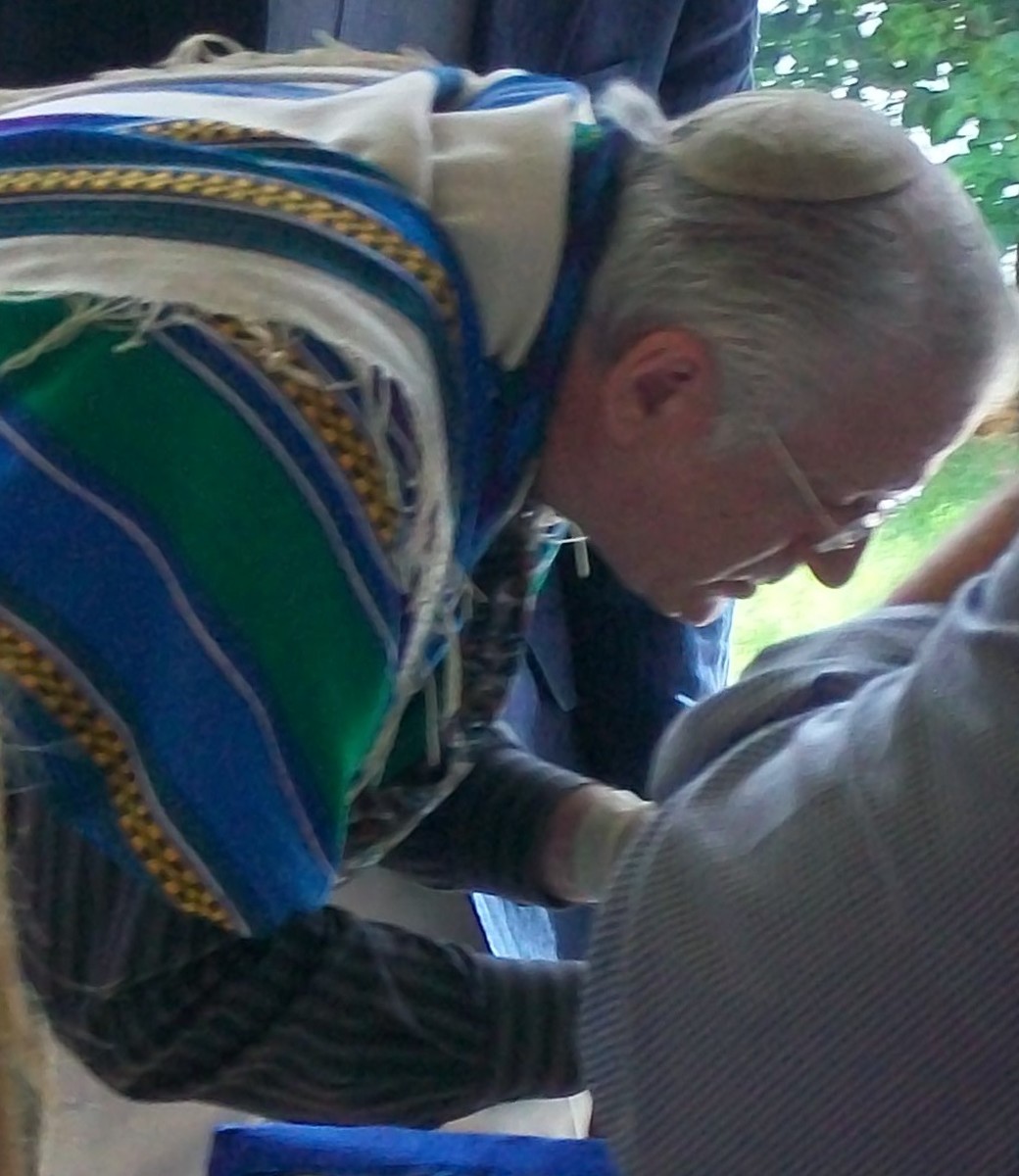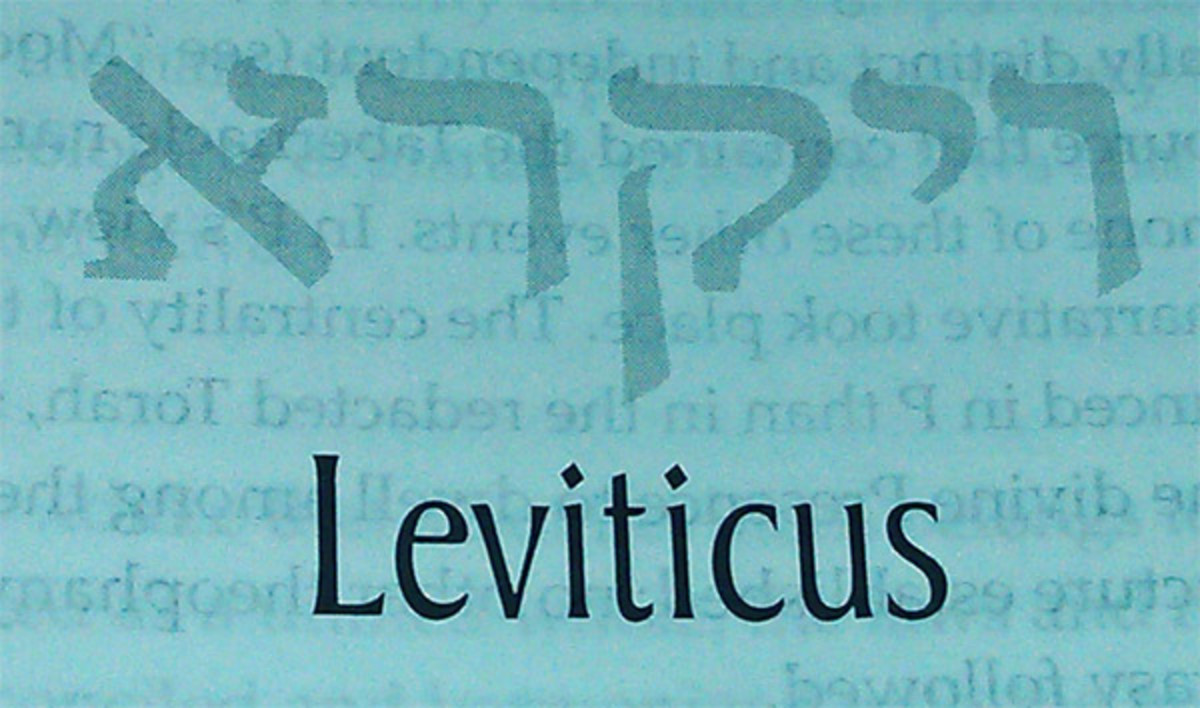Why Karaism: The Nazirite
Understanding the Nazirite should not be a difficult task. The oath is about taking a pledge and dedicating oneself to God for a period of 30 days minimum. By adopting a certain outward appearance, all will see that the individual has taken this pledge and should be honoured. One would not think that this is too difficult to understand knowing that it is very clearly outlined in Numbers 6. As can be read there, the Nazirite vow is open to both men and women, and even though the pronoun ‘he’ is used solely afterwards, it is the initial decree that it is for either sex to undertake that we realize the use of ‘he’ is for convenience sake only. Abstinence from wine and strong drink is the primary obligation since it is listed first. Pretty clear that it means no alcoholic beverages. Strong drink is synonymous with alcohol. And anything to do with grapes is off the menu. Very specific about that because there would always be the chance it would ferment to a degree, even in the stomach. Secondly, no razor is to be taken to the head, translating as no hair cuts for the entire duration of the vow. The locks shall be allowed to grow long; it states that very clearly. And thirdly, the Nazirite shall not approach a dead body, not even for the sake of someone close like a father or mother. Now the chance that accidental defilement occurs, as in the case of someone falling dead beside the Nazirite unexpectedly, then the Nazirite must end the vow and perform the sin offering. Once done, the Nazirite is to begin the full period of dedication once more and all the days prior to the defilement are null and void.
The issue of what is to be done when voluntary defilement is performed is left open but not too great a mystery since intentionally breaking an oath to God is covered under the Ten Commandments when it states “Thou shall not take God’s name in vain.” How the punishment is performed as in the case of Samson, probably the most famous of Nazirites, may be entirely in the hands of God to mete out.

Talmudic Disillusionment
So the logical question should be, if the Nazirite vow is so black and white, how is it that the Rabbis can turn it into one of the most confusing issues in Talmudic Law? The answer is simple. Nazirites were to be seen as the holiest of men. They were to be viewed as judges and leaders, their significance far outweighing the authority of lesser men. Whether we use Samson, or Samuel or even Absolom as our examples, they were always men that others would defer to. And therein lies the problem because if a man was to cross the paths of both a Nazirite and a Rabbi, and posed a question, by who’s authority should he abide. The answer should automatically be the Nazirite since he/she wears the crown and glory of God. The Torah tells us that clearly. Well, there was no way in the world that the Rabbis were going to voluntarily abrogate their self-claimed authority to those they considered lesser individuals. And can you imagine if the Nazirite in question was a woman? They would have had her in some way declared a witch and stoned before they every respected her opinion on any matter. So as you can see, it became necessary for them to make the undertaking of a Nazirite vow as difficult as possible and they certainly did that as the following passages from the Talmud will demonstrate. My comments of which I invite discussion are in bold following each statement.
I SHALL BE COMELY … HE BECOMES A NAZIRITE. Perhaps he means, 'l shall be comely before Him in [the performance of] precepts. as has been taught: [The verse]. This is my God and I will glorify Him means, I will glorify Him in [the performance of] precepts; I shall build an attractive booth, procure a faultless palm-branch. wear elegant fringes, write a mangificent Scroll of the Law and provide it with wrappings of choicest silk? — Samuel said: [We assume that] he takes hold of his hair when he says, 'I shall be comely.'
Clearly these are additions of undertakings that have nothing to do with the Nazirite vow. Other than performance of the precepts (commandments of the Torah, particularly the restrictions of the vow) there are no other requirements. Notice that the other precepts they list all involve expensive purchases that would restrict the ordinary person from becoming a Nazirite. A very clever way of excluding those they considered inferior to themselves.
[Seeing that to become] a nazirite is in a way a sin, can it be termed comely? —
Because he denies himself that which the Torah has permitted.
Reverse logic that actually challenges God by declaring the Nazirite a sinner. God specifically demanded that the denials run contrary to what is permitted. It wouldn’t be a personal sacrifice if there was no denial. A brilliant piece of logic in which they can inform the people not to undertake a Nazirite vow as it would make them sinners in other respects but clearly demonstrating that they had ulterior motives.
Yes. For even R. Eliezer ha-Kappar who says that a nazirite is accounted a sinner, means only the nazirite who has contracted ritual impurity; for, since he must nullify [his previous abstinence] in accordance with the rule laid down by the Merciful One, But the former days shall be void, because his consecration was defiled, there is a danger that he may break his nazirite vow. But a nazirite who remains ritually clean is not termed a sinner.
At least they recognized in the preceding passage that they better qualify their sinner label as it was a rebuke of God. But accidental defilement was not the same as sinning. The Torah makes that perfectly clear and the reference by the Rabbis that it was a sin was still an effort on their part to intimidate and convince people not to undertake the oath.
I INTEND TO CURL [MY HAIR]. How do we know that this [word MESALSEL] refers to the curling of the hair? — From a remark made by a maidservant of Rabbi's household, who said to a certain man: How much longer are you going to curl [mesalsel] your hair? But perhaps [it refers to] the Torah in accordance with the verse, Extol her [salseleha] and she will exalt thee? — Samuel said: Here, too, we suppose that he takes hold of his hair.
I MEAN TO TEND [MY HAIR]. How do we know that this [word MEKALKEL] refers to the tending of his hair? — From what we learnt: 'With regard to orpiment. R. Judah said that there must be sufficient to depilate the kilkul,' and Rab commented: [This means the hair of] one of the temples. But might it not mean tending the poor. in accordance with the verse, And Joseph sustained [wa-yekalkel] his father and his brothers? — Samuel said: Here too. we assume that he takes hold of his hair.
I UNDERTAKE TO DEVELOP TRESSES,' HE BECOMES A NAZIRITE. How do we know that this [word] shilluah signifies increase? — From the verse, Thy shoots [shelohayik] are a park of pomegranates. But perhaps it has the significance of 'removal' in accordance with the verse, And sendeth [we-sholeah] waters upon the fields? — The occurrence of the word pera' [tresses] in connection with the nazirite gives the tanna the clue. It says here, He shall be holy. he shall let the locks [pera'] grow long. and it says elsewhere regarding an ordinary priest, Nor' suffer their locks [pera'] to grow long [yeshallehu]. Alternatively, we can say that the sholeah used of water, also signifies increase, for when produce is watered it shoots up.
If ever the Talmud has made an attempt to confuse and bewilder, this is it. The requirement and instruction in the Torah was that the Nazirite would grow his/her hair long and no razor shall touch the head during the period of the vow. God didn’t talk about what coiffure to visit, nor what style was preferable. The overall intent is to barrage the Nazirite with information overload to the point of deciding the entire vow is too confusing and the Oath that would be necessary to swear would become too convoluted. The fact was that the Oath that needed to be said only required the person to say that they intended to grow their hair long, nothing else.
[IF HE SAYS] 'I TAKE UPON MYSELF [AN OBLIGATION INVOLVING] BIRDS,' R. MEIR SAYS HE BECOMES A NAZIRITE. What is R. Meir's reason? — Resh Lakish said: [In making this vow] he has in mind the birds that are coupled with hair in the scriptural verse, Till his hair was grown long like eagles' feathers, and his nails like birds' claws. R. Meir is of the opinion that a man will refer to one thing when he means something else occurring in the same context,
Ezek. XLIV, 20. In Sanh. 22b this same comparison is made to show that pera' means a growth of thirty days' duration (the normal duration of a nazirite vow). Thus whether shilluah means 'grow' or remove', the nazirite vow is implicit in the word pera'
Birds? Nails? Other than the two turtle doves for a sin offering when defilement occurred, there was no reference to birds in the scripture. Where did they obtain this from? Nails like eagle claws? Already the additions, restrictions and nonsense that the Rabbis were adding in order t make the vow virtually impossible had begun in earnest.
MISHNAH . [IF A MAN SAYS] 'I VOW TO BE LIKE SAMSON, THE SON OF MANOAH, WHO WAS THE HUSBAND OF DELILAH, OR 'WHO PLUCKED UP THE GATES OF GAZAH,' OR 'WHOSE EYES THE PHILISTINES PUT OUT,' HE BECOMES A NAZIRITE LIKE SAMSON.
GEMARA . Why must [the Mishnah] specify all these expressions? — All are necessary. For if he were to say. 'I wish to be like Samson,' I might think that some other Samson [was intended], and so we are told [that he must add] 'like the son of Manoah.' Again, if he were to add [only] 'the son of Manoah,' I might think that there is someone else so named, and so we are told [that he must add], 'like the husband of Delilah,' or 'like him whose eyes the Philistines put out.'
MISHNAH . WHAT DIFFERENCE IS THERE BETWEEN A NAZIRITE LIKE SAMSON AND A LIFE-NAZIRITE? A LIFE-NAZIRITE. WHENEVER HIS HAIR BECOMES BURDENSOME, MAY THIN IT WITH A RAZOR AND THEN OFFER THREE ANIMAL SACRIFICES, WHILST SHOULD HE BE RITUALLY DEFILED, HE MUST OFFER THE SACRIFICE [PRESCRIBED] FOR DEFILEMENT. THE NAZIRITE LIKE SAMSON IS NOT PERMITTED TO THIN HIS HAIR SHOULD IT BECOME BURDENSOME, AND IF [RITUALLY] DEFILED, DOES NOT OFFER THE SACRIFICE [PRESCRIBED] FOR DEFILEMENT.
GEMARA . How does the life-nazirite come in here? — There is a hiatus [in the Mishnah]. and it should read as follows: If a man says, 'I intend to be a life-nazirite,' he becomes a life-nazirite. What difference is there between a nazirite like Samson and a life-nazirite? A life-nazirite whenever his hair becomes burdensome may thin it with a razor and then offer three animal sacrifices, whilst should he be ritually defiled, he must offer the sacrifice [prescribed] for defilement. The nazirite like Samson is not permitted to thin his hair with a razor should it become burdensome, and if ritually defiled does not offer the sacrifice [prescribed] for defilement.
[You say that the nazirite like Samson] does not have to offer the sacrifice [prescribed] for defilement, enabling me to infer that he is subject to the nazirite obligation [which forbids him to defile himself]. Who then is [the author of] our Mishnah, [seeing that] it can be neither R. Judah nor R. Simeon? For it has been taught: R. Judah said that a nazirite like Samson is permitted to defile himself [deliberately, by contact] with the dead, for Samson himself did so; R. Simeon says that if a man declares. '[I intend to be] a nazirite like Samson,' his statement is of no effect, since we are not aware that Samson personally ever pronounced a nazirite vow. [We ask then:] Who [is the author of our Mishnah]? It cannot be R. Judah, for he says that [a nazirite like Samson] may even [defile himself] intentionally. whereas our Mishnah [merely] states [that no sacrifice need be offered] if he has become defiled [accidentally]; nor can it be R. Simeon since he says that the vow does not become operative at all! — Actually it is R. Judah [and the nazirite like Samson is permitted to defile himself] but because in referring to the life-nazirite, the Mishnah uses the expression 'SHOULD HE BE [RITUALLY] DEFILED.' the same expression is used in referring to the nazirite like Samson.
So much for classic double talk. If you were standing before these Rabbis and they started demanding to know which kind of life-long Nazirite you intended to be, and that you had to explain right there and then, whether you’d be one that does not sacrifice when defiled or one that does sacrifice when defiled, or one like Samson the Judge, or perhaps like some other Samson, or one that never cuts his hair versus one that is allowed to ritually cut his hair, you’d probably turn around and walk away thinking that it was a bad idea in the first place. None of these demands, comments, rules that the Rabbis have put into place have anything to do with what is written in the Torah. They knew it and even admit that they grabbed these practically from thin air when they wrote their Mishnah. But what is most alarming is that most of the rules they were putting in place were in direct contradiction to God’s definition of the Nazarite vow. So essentially one could think of themselves undertaking a vow but actually performing in a manner, such as cutting their hair, or defiling themselves and continuing on without sin offerings which immediately put them in violation of the oath. Essentially they weren’t Nazirites any longer and their oath had become meaningless.
[It may be said:] In the case of the nazirite, too, is there not a phrase 'Into the Lord'? — This is required for the purpose taught [in the following passage]: Simon the Just said: In the whole of my life, I ate of the guilt-offering of a defiled nazirite [only once]. This man who came to me from the South country, had beauteous eyes and handsome features with his locks heaped into curls. I asked him: 'Why, my son, didst thou resolve to destroy such wonderful hair?' He answered: 'In my native town. I was my father's shepherd, and, on going down to draw water from the well, I used to gaze at my reflection [in its waters]. Then my evil inclination assailed me, seeking to compass my ruin, and so I said to it, "Base wretch! Why dost thou plume thyself on a world that is not thine own, for thy latter end is with worms and maggots. I swear I shall shear these locks to the glory of Heaven!"' Then I rose, and kissed him upon his head. and said to him: 'Like unto thee, may there be many nazirites in Israel. Of such as thou art, does the verse say, When a man shall clearly utter a vow, the vow of a nazirite to consecrate himself unto the Lord.'
A most interesting tale in which Simon the Just has declared the ending of the Nazirite vow, or breaking the oath more righteous than the continuation of the oath. As a Nazirite the man was clearly vain and narcissistic. Now the Torah states that the Nazirite wears his hair as an adornment that is the revelation of God’s glory like a crown. The Nazirite does so for the purpose of revealing God’s glory, not his own. So in this tale, the words from the Nazirite’s mouth implies that our world is so horrible that it is an affront for others to see the heavenly glory while living in suffering. Then he states that he terminates his vow through defilement for the glory of Heaven which is a sharp contradiction to God’s instructions, yet Simon praises him for it. It can not be made more clear by this passage how much the Rabbis wanted to dissuade anyone from undertaking the vow.
MISHNAH . [IF A MAN SAYS,] 'I DECLARE MYSELF A NAZIRITE, ON CONDITION THAT I CAN DRINK WINE, OR CAN HAVE CONTACT WITH THE DEAD', HE BECOMES A NAZIRITE, AND ALL THESE THINGS ARE FORBIDDEN HIM. [IF HE SAYS,] 'I WAS AWARE THAT THERE IS SUCH A THING AS NAZIRITESHIP BUT I WAS NOT AWARE THAT A NAZIRITE IS FORBIDDEN TO DRINK WINE', HE IS BOUND [TO HIS VOW]. R. SIMEON, HOWEVER, RELEASES HIM. [IF HE SAYS,] 'I WAS AWARE THAT A NAZIRITE IS FORBIDDEN TO DRINK WINE, BUT I IMAGINED THAT THE SAGES WOULD GIVE ME PERMISSION, SINCE I CANNOT DO WITHOUT WINE', OR 'SINCE I AM A SEXTON', HE IS RELEASED. R. SIMEON, HOWEVER, BINDS HIM [TO HIS VOW].
GEMARA . It has been taught in support of Rabina's view: If he said, 'I declare myself a nazirite, on condition that I may drink wine, or have contact with the dead,' he becomes a nazirite and all these things are forbidden to him, since the condition he lays down is contrary to an injunction of the Torah; and whenever a condition is contrary to an injunction of the Torah, it is void.
[IF HE SAYS] I WAS AWARE THAT A NAZIRITE IS FORBIDDEN TO DRINK WINE [etc.]: In the preceding clause, we find it is [the Rabbis] who bind him [to his vow] and R. Simeon who releases him [and why is it not the same here]? — Here, too, it should read: [The Rabbis] bind him whilst R. Simeon releases.
Why don’t we just let the Rabbis make a total mockery of the Nazirite vow here? The fact is that to undertake the vow there are no ifs or buts. The Torah is quite specific and it is not up to the rabbis to debate when a vow is in force and when it is not. If it does not respect the strict requirements of the Torah, then it cannot be a Nazirite vow and those so presumptuous to think that they can debate the issue or redefine it are sadly mistaken.
GEMARA . It has been stated: If a man makes a nazirite vow whilst in a graveyard, then according to R. Johanan the naziriteship takes effect, but according to Resh Lakish it does not take effect. R. Johanan says: The naziriteship does take effect because he considers it merely to be suspended and in readiness, so that whenever he becomes ritually clean, it commences to operate; whereas Resh Lakish holds that, the naziriteship does not take effect; if he repeats [the vow] later [when he is clean], it will commence to operate, but not otherwise.
R. Johanan raised an objection to Resh Lakish [from the following]: IF A MAN MAKES A NAZIRITE VOW WHILST IN A GRAVEYARD, THEN EVEN IF HE REMAINS THERE FOR THIRTY DAYS, THESE ARE NOT RECKONED, AND HE DOES NOT HAVE TO BRING THE SACRIFICE [PRESCRIBED] FOR RITUAL DEFILEMENT. [This implies, does it not,] that it is only the sacrifice [prescribed] for ritual defilement that he does not have to bring, but [the vow] does take effect? — He replied: [Not so;] he does not come within the scope of the law, either of ritual defilement or of the sacrifice.
An objection was again raised by him [from the following]: If a man is ritually defiled, and vows to become a nazirite, he is forbidden to poll, or to drink wine, or to touch a dead body. Should he poll, or drink wine, or touch a dead body, he is to receive the forty stripes. If now you admit that [the vow] takes effect, then we see why he receives the forty stripes; but if you say that it does not take effect, why should he receive the forty stripes?
Firstly, I would like to state that any man making a Nazirite vow while in a state of defilement is doing so for no other reason to mock God and demonstrate how little he thinks of the Torah. There was no issue here for the rabbis to debate. The man was ridiculing the scripture right from the onset and merited punishment immediately. For the Rabbis to even think this issue was worthy of discussion demonstrated how far they had fallen from the scripture.
MISHNAH . IF A WOMAN UNDERTAKES A NAZIRITE VOW AND THEN DRINKS WINE OR IS DEFILED BY A CORPSE, SHE IS TO RECEIVE FORTY [STRIPES]. IF HER HUSBAND DECLARES IT VOID WITHOUT HER BEING AWARE OF IT, AND SHE DRINKS WINE OR IS DEFILED BY A CORPSE, SHE DOES NOT RECEIVE THE FORTY [STRIPES]. R. JUDAH SAID: ALTHOUGH [IT MAY BE A FACT THAT] SHE DOES NOT RECEIVE THE FORTY [STRIPES]. SHE SHOULD RECEIVE THE STRIPES INFLICTED FOR DISOBEDIENCE.
I find it amusing that the Rabbis would discuss endlessly how a man could avoid the punishments if he broke the vow but how quick they were to see that the woman received physical punishment. Perchance were they sexist? With this ruling they were able to persuade most women not to undertake the vow because odds were that one way or another they were going to receive forty lashes.
MISHNAH . IF [PEOPLE] WERE WALKING ALONG THE ROAD AND [SAW] SOMEONE COMING TOWARDS THEM, AND ONE SAID, 'I DECLARE MYSELF A NAZIRITE IF IT IS SO-AND-SO, WHILST ANOTHER SAID, 'I DECLARE MYSELF A NAZIRITE IF IT IS NOT SO-AND-SO,' [AND A THIRD MAN,] ' DECLARE MYSELF A NAZIRITE IF ONE OF YOU IS A NAZIRITE,' [A FOURTH, 'I DECLARE MYSELF A NAZIRITE] IF NEITHER OF YOU IS A NAZIRITE,' [A FIFTH, 'I DECLARE MYSELF A NAZIRITE] IF BOTH OF YOU ARE NAZIRITES,' [AND A SIXTH, 'I DECLARE MYSELF A NAZIRITE] IF ALL OF YOU ARE NAZIRITES.' BETH SHAMMAI SAY THAT ALL [SIX] OF THEM ARE NAZIRITES, BUT BETH HILLEL SAY THAT ONLY THOSE WHOSE WORDS WERE NOT FULFILLED, ARE NAZIRITES. R. TARFON SAID: NOT ONE OF THEM IS A NAZIRITE. IF [THE PERSON APPROACHING] TURNED AWAY SUDDENLY [WITHOUT BEING IDENTIFIED], HE IS NOT A NAZIRITE. R. SIMEON SAYS: HE SHOULD SAY, 'IF I WAS RIGHT, I AM A NAZIRITE OBLIGATORILY, OTHERWISE I WISH TO BE A NAZIRITE, VOLUNTARILY.
Riddles upon riddles. The undertaking of the Nazirite vow was a contract between a person directly with God. From where did the Rabbis obtain this deluded idea that it could become subcontracted to other arrangements? This was an abuse of the law.
MISHNAH . IF [ONE MAN] SAW A KOY AND SAID, 'I DECLARE MYSELF A NAZIRITE IF THAT IS A BEAST OF CHASE, [AND ANOTHER] 'I DECLARE MYSELF A NAZIRITE IF THAT IS NOT A BEAST OF CHASE,' [A THIRD SAID] 'I DECLARE MYSELF A NAZIRITE IF THAT IS CATTLE,' [A FOURTH SAID,] 'I DECLARE MYSELF A NAZIRITE IF THAT IS NOT CATTLE,' [A FIFTH SAID,] I DECLARE MYSELF A NAZIRITE IF THAT IS BOTH A BEAST OF CHASE AND CATTLE,' [AND A SIXTH SAID,] 'I DECLARE MYSELF A NAZIRITE IF THAT IS NEITHER BEAST OF CHASE NOR CATTLE.' [THEN A SEVENTH SAID,] 'I DECLARE MYSELF A NAZIRITE IF ONE OF YOU IS A NAZIRITE,' [AN EIGHTH SAID,] I DECLARE MYSELF A NAZIRITE IF NOT ONE OF YOU IS A NAZIRITE,' [WHILST A NINTH SAID,] 'I DECLARE MYSELF A NAZIRITE IF YOU ARE ALL NAZIRITES, THEN ALL OF THEM BECOME NAZIRITES.
Now we suddenly have a situation where the rabbis are permitting the undertaking of a Nazirite vow to be the result of wagering. The Koy being a deer or antelope or similar kind of animal is being used as an implement for what is surely a game by these men to determine if it is wild ruminant or domesticated ruminant. This entire paragraph is once again a mockery of the Torah and the Rabbis participation in such a debate is shameful.
THERE IS A SEPARATE PENALTY FOR WINE, FOR GRAPES, FOR HARZANIM AND FOR ZAGIM. R. ELEAZAR B. AZARIAH SAID: THERE IS NO PENALTY [IN THE CASE OF THE LAST TWO SPECIES] UNLESS HE EATS TWO HARZANIM AND ONE ZAG.
BY HARZANIM AND ZAGIM ARE MEANT THE FOLLOWING. ACCORDING TO R. JUDAH, HARZANIM MEANS THE OUTER PORTION [OF THE GRAPE]. ZAG THE INNER PORTION, BUT R. JOSE SAID: THAT YOU MAY NOT ERR, [THINK OF] THE ZOG [BELL] OF AN ANIMAL, OF WHICH THE OUTER PART IS TERMED THE ZOG [HOOD]. AND THE INNER PART THE INBAL [CLAPPER].
GEMARA . THREE THINGS ARE FORBIDDEN TO A NAZIRITE, VIZ.: RITUAL DEFILEMENT etc.: Products of the vine are [forbidden] but not the vine itself, so that our Mishnah differs from R. Eleazar, for it has been taught: R. Eleazar said that even leaves and shoots [of the vine] are included [in the things forbidden to a nazirite].
Some draw the inference from the subsequent clause, viz.: WHILST THERE IS NO PENALTY UNLESS HE EATS AN OLIVE'S BULK OF GRAPES. GRAPES only [carry a penalty] but not the vine itself, so that our Mishnah differs from R. Eleazar, for it has been taught: R. Eleazar said that even leaves and shoots are included.
Now which part of the Torah instructions not to eat any part of the grape or vine in Numbers 6:4 am I confused by. I thought I understood it but clearly I don’t according to these rabbis.
As should be evident, from this article on Nazirite vows, the Torah should never be seen as inferior to the Talmud, nor should it’s teaching be subject to the interpretations of these acclaimed Rabbis that have been quoted in the Rabbanite’s Mishnah and Gemara. The fact is, as God has amply advised, if you purposely distort one part of His laws for any reason, then it is as if you are guilty of refuting all of His laws because you did so willingly and with intent. That is one more reason of ‘why Karaism’ is the true path of Judaism.






